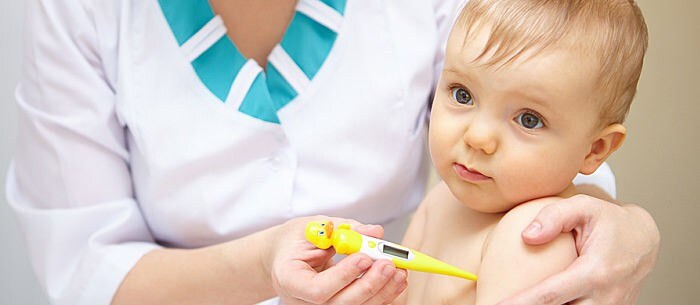You’ve just settled in for the night when the harsh sound of your baby coughing startles you. A quick check confirms a hot forehead and runny nose: You have a sick baby on your hands. When your little one gets sick for the first time, you may not know what to reach for first — the doctor’s emergency line, baby medication or a thermometer. Take a deep breath and ask yourself these questions.
Is Your Baby Acting Normal?
If you notice your little one is feeling under the weather, start with simple observation. “Is your child interacting the way he usually does — making eye contact and eating — or is he too quiet and listless? Is he rubbing his ears?” asks Dr. Robert Pantell, a pediatrician and the author of “Taking Care of Your Child.” Keep an eye on your baby’s symptoms, and note his behaviors throughout the day. When in doubt, Pantell says to call your child’s doctor.
And check out When Is a Fussy Baby Telling You She’s Sick — or Not?
How High Is Your Baby’s Fever?
Not all fevers are created equally, and low-grade fevers typically resolve themselves with time. Dr. Natasha Burgert, a pediatrician and mom blogger, recommends using rectal thermometers for an accurate reading. If your child is under 3 months old and has a fever of 100.4 or over, a trip to the doctor is in order, according to the National Institutes of Health (NIH). “For kids 3 months or older, the number really isn’t important, unless it goes above 102,” says Dr. Burgert. “I remember a patient of mine rushing into my office because her baby never had a fever before, and that’s fine. It’s also OK to ride it out, unless you’re dealing with a newborn or there are other symptoms like faster than usual breathing,” she adds.
Should You Give Medication or Let the Fever Ride?
“Both giving meds and not giving meds is OK,” says Dr. Burgert. “Fever-reducing medications keep your child comfortable — which helps you be comfortable.” Dr. Pantell agrees, adding, “Fever medication doesn’t kill viruses or bacteria.” He advises parents to seek medical attention if your newborn has a fever over 100.4, but adds, “If your child is over 12 weeks old, reaching for medication is up to you if the number is below 102.”
Before giving fever reducers to your baby under 3 months, check with your pediatrician. Children under 6 months should not have ibuprofen, and aspirin should be avoided unless instructed by your doctor, according to the NIH. Acetaminophen can be taken every four to six hours. Before giving any medication, be sure you check the dosage amounts. Dealing with a sick baby gets hectic, so jot down every time you give mediation to avoid giving too much.
“If your baby seems distressed, comforting him is more important than bringing a low fever down,” says Dr. Burgert. Look to your baby for cues about how to make him comfortable. Sometimes, light dressing will be best, but avoid bundling him up, even if he has the chills. Instead, make sure the room is at a comfortable temperature, and hold baby against your warm body. Babies typically respond well to snuggling and the comfort of skin-on-skin touch when they aren’t feeling well.
How Do You Keep Your Sick Baby Nourished?
Keeping your little one hydrated is key when he’s not feeling well. You might want water, but breast milk or infant electrolyte solution is better for babies. “Water is OK for babies older than 6 months, but younger than that, their kidneys can’t handle straight water,” says Dr. Burgert. Dr. Pantell advises parents to keep track of diaper changes, too. “Check with the doctor if your infant is vomiting and has diarrhea, without producing many wet diapers.” This could be a sign of dehydration, so inform your pediatrician if you’re concerned.
If you talk to a thousand parents, you’ll get a thousand different suggestions for taking care of a sick baby. You know your baby better than anyone else, so go with your gut. As Dr. Burgert suggests, “Trust your instincts. I’m not my kid’s doctor, I’m their mom. If I’m worried I call their doctor and you should, too.”
Corey Whelan is a freelance writer specializing in all things mom. She is also a single mom living in Brooklyn, New York.
* This article is for general informational purposes only. It is not intended nor implied to be providing medical advice and is not a substitute for such advice. The reader should always consult a health care provider concerning any medical condition or treatment plan. Neither Care.com nor the author assumes any responsibility or liability with respect to use of any information contained herein.






